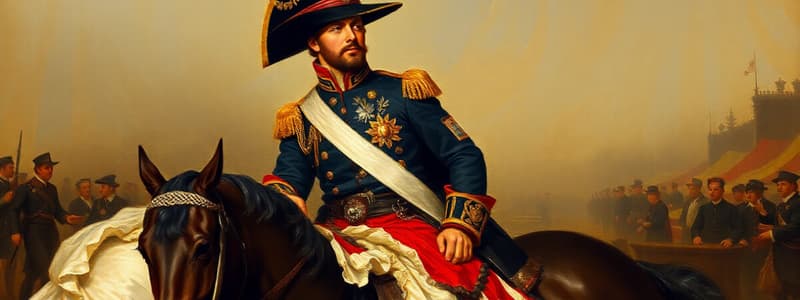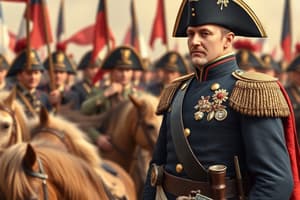Podcast
Questions and Answers
Napoleon Bonaparte was one of the best and most able generals of the French Army during the French ______.
Napoleon Bonaparte was one of the best and most able generals of the French Army during the French ______.
Revolution
In 1799, Napoleon overthrew the ______ and established the Consulate in its place.
In 1799, Napoleon overthrew the ______ and established the Consulate in its place.
Directory
Napoleon crowned himself emperor of France at the Cathedral of ______ in Paris.
Napoleon crowned himself emperor of France at the Cathedral of ______ in Paris.
Notre Dame
Napoleon defeated the alliance of Austria and Russia at the Battle of ______ in 1806.
Napoleon defeated the alliance of Austria and Russia at the Battle of ______ in 1806.
The Confederation of the ______ was initially made up of 16 German states.
The Confederation of the ______ was initially made up of 16 German states.
The Peninsular Wars dragged on from 1807 to ______ and drained Napoleon of both men and resources.
The Peninsular Wars dragged on from 1807 to ______ and drained Napoleon of both men and resources.
Napoleon launched the Continental Blockade in ______ to stop commerce between Europe and Britain.
Napoleon launched the Continental Blockade in ______ to stop commerce between Europe and Britain.
Napoleon invaded ______ in 1812 with a huge army.
Napoleon invaded ______ in 1812 with a huge army.
Admiral Nelson, a commander in the British Royal Navy, defeated Napoleon at the Battle of ______.
Admiral Nelson, a commander in the British Royal Navy, defeated Napoleon at the Battle of ______.
Historians refer to the Peninsular Wars as Napoleon's Spanish ______.
Historians refer to the Peninsular Wars as Napoleon's Spanish ______.
Napoleon reached ______, but was still unable to win a decisive victory over the Russians.
Napoleon reached ______, but was still unable to win a decisive victory over the Russians.
The coalition that defeated Napoleon consisted of England, Prussia, Russia, and ______.
The coalition that defeated Napoleon consisted of England, Prussia, Russia, and ______.
After his escape from Elba, Napoleon ruled France for ______ days.
After his escape from Elba, Napoleon ruled France for ______ days.
Napoleon faced a crushing defeat at the Battle of ______ under the Duke of Wellington.
Napoleon faced a crushing defeat at the Battle of ______ under the Duke of Wellington.
The failure of the ______ campaign severely damaged Napoleon’s reputation.
The failure of the ______ campaign severely damaged Napoleon’s reputation.
Napoleon introduced the ______ in 1804, based on the principles of liberty, equality, and fraternity.
Napoleon introduced the ______ in 1804, based on the principles of liberty, equality, and fraternity.
The unification of Europe was inspired by ______ the Great.
The unification of Europe was inspired by ______ the Great.
Together, the French Revolution and Napoleon’s rule brought an end to ______ in France.
Together, the French Revolution and Napoleon’s rule brought an end to ______ in France.
The economic system where the means of production are owned privately is called ______.
The economic system where the means of production are owned privately is called ______.
Most of Napoleon's army perished during the Russian campaign, leaving only a ______ fraction to return safely to France.
Most of Napoleon's army perished during the Russian campaign, leaving only a ______ fraction to return safely to France.
Napoleon's retreat from Moscow occurred after he achieved a decisive victory over the Russians.
Napoleon's retreat from Moscow occurred after he achieved a decisive victory over the Russians.
The coalition that defeated Napoleon included France, Prussia, Russia, and Austria.
The coalition that defeated Napoleon included France, Prussia, Russia, and Austria.
Napoleon was exiled to the island of Elba after his defeat at the Battle of Waterloo.
Napoleon was exiled to the island of Elba after his defeat at the Battle of Waterloo.
The Code Napoleon was introduced to unify the legal systems of the countries Napoleon conquered.
The Code Napoleon was introduced to unify the legal systems of the countries Napoleon conquered.
Napoleon’s rule resulted in the strengthening of feudalism in France.
Napoleon’s rule resulted in the strengthening of feudalism in France.
Napoleon's military campaigns did not significantly affect his reputation.
Napoleon's military campaigns did not significantly affect his reputation.
The introduction of the Code Napoleon in 1804 was influenced by the principles of the French Revolution.
The introduction of the Code Napoleon in 1804 was influenced by the principles of the French Revolution.
Napoleon successfully created a unified European Empire throughout his conquests.
Napoleon successfully created a unified European Empire throughout his conquests.
Napoleon established the Consulate after overthrowing the Directory in 1799.
Napoleon established the Consulate after overthrowing the Directory in 1799.
The Confederation of the Rhine included both Austria and Prussia at the start.
The Confederation of the Rhine included both Austria and Prussia at the start.
Napoleon died in exile on the island of Elba.
Napoleon died in exile on the island of Elba.
Napoleon's military campaigns expanded the French Empire across most of Europe between 1801 and 1812.
Napoleon's military campaigns expanded the French Empire across most of Europe between 1801 and 1812.
The economic system of capitalism was facilitated by the end of feudalism during Napoleon's rule.
The economic system of capitalism was facilitated by the end of feudalism during Napoleon's rule.
The Peninsular Wars began when Spain and Portugal supported the Continental Blockade.
The Peninsular Wars began when Spain and Portugal supported the Continental Blockade.
The Battle of Trafalgar resulted in a significant defeat for Napoleon at the hands of Admiral Nelson.
The Battle of Trafalgar resulted in a significant defeat for Napoleon at the hands of Admiral Nelson.
The Russians employed a strategy of burning their own resources to counter Napoleon's invasion.
The Russians employed a strategy of burning their own resources to counter Napoleon's invasion.
Napoleon's reign in Europe lasted until 1815 when he was defeated and lost most of his territories.
Napoleon's reign in Europe lasted until 1815 when he was defeated and lost most of his territories.
Napoleon's reforms aimed at unifying the states under the Confederation of the Rhine were inconsistent with his empire's administration.
Napoleon's reforms aimed at unifying the states under the Confederation of the Rhine were inconsistent with his empire's administration.
Napoleon referred to the Peninsular Wars as his Spanish Wound.
Napoleon referred to the Peninsular Wars as his Spanish Wound.
Napoleon crowned himself emperor of France in 1806.
Napoleon crowned himself emperor of France in 1806.
Flashcards are hidden until you start studying
Study Notes
The Rise of Napoleon
- Monarchy abolished in France after the French Revolution, causing concern among European monarchies.
- Napoleon Bonaparte emerged as a military genius, leading the French army during the Revolution.
- Overthrew the Directory in 1799 and established the Consulate, becoming the first consul among three consuls.
- Crowned himself emperor in 1804 at Notre Dame in Paris, marking the foundation of the First French Empire.
Napoleon's Military Campaigns
- From 1801 to 1812, Napoleon expanded his rule over most of Europe, although he later lost many territories by 1815.
- In 1805, Admiral Nelson defeated Napoleon at the Battle of Trafalgar; in retaliation, Napoleon initiated the Continental Blockade in 1806.
The Confederation of the Rhine
- Defeated the Austrian-Russian alliance at the Battle of Austerlitz in 1806 and formed the Confederation of the Rhine.
- Initially included 16 German states, eventually growing to 35; Austria and Prussia opted out.
- Unified administration across the Confederation paved the way for future German unification.
The Peninsular Wars
- Napoleon invaded Spain and Portugal (1807-1814) due to their non-compliance with the Continental Blockade.
- This prolonged conflict drained resources and manpower, referred to as Napoleon's Spanish Ulcer.
The Russian Campaign
- In 1812, Napoleon invaded Russia with a vast army; Russians employed a scorched earth strategy.
- Faced with food shortages and winter conditions, the campaign ended disastrously for the French, with a significant loss of troops.
The Battle of Waterloo
- A coalition of England, Prussia, Russia, and Austria defeated Napoleon, leading to his exile to Elba.
- Napoleon escaped and ruled France for 100 days but suffered a decisive defeat at the Battle of Waterloo in 1815.
- Following the loss, he was imprisoned on Saint Helena, where he died in 1821.
Causes of Napoleon’s Downfall
- Military campaigns bred discontent, resulting in loss of life and financial strain on France.
- Hostile reactions initiated from the Catholic Church and dispossessed rulers diminished support.
- The failure of the Russian campaign severely tarnished his reputation and decreased his military capabilities.
Impact of Napoleon's Rule
- Napoleon aimed to create a unified European Empire and was inspired by historical figures like Alexander the Great.
- Implemented the Code Napoleon in 1804, promoting principles of liberty, equality, and fraternity across conquered territories.
- The new legal code contributed to unified administration and influenced modern European legal systems.
- Together with the French Revolution, Napoleon ended feudalism in France, abolishing noble and clerical privileges, thus promoting capitalism.
The Rise of Napoleon
- Monarchy abolished in France after the French Revolution, causing concern among European monarchies.
- Napoleon Bonaparte emerged as a military genius, leading the French army during the Revolution.
- Overthrew the Directory in 1799 and established the Consulate, becoming the first consul among three consuls.
- Crowned himself emperor in 1804 at Notre Dame in Paris, marking the foundation of the First French Empire.
Napoleon's Military Campaigns
- From 1801 to 1812, Napoleon expanded his rule over most of Europe, although he later lost many territories by 1815.
- In 1805, Admiral Nelson defeated Napoleon at the Battle of Trafalgar; in retaliation, Napoleon initiated the Continental Blockade in 1806.
The Confederation of the Rhine
- Defeated the Austrian-Russian alliance at the Battle of Austerlitz in 1806 and formed the Confederation of the Rhine.
- Initially included 16 German states, eventually growing to 35; Austria and Prussia opted out.
- Unified administration across the Confederation paved the way for future German unification.
The Peninsular Wars
- Napoleon invaded Spain and Portugal (1807-1814) due to their non-compliance with the Continental Blockade.
- This prolonged conflict drained resources and manpower, referred to as Napoleon's Spanish Ulcer.
The Russian Campaign
- In 1812, Napoleon invaded Russia with a vast army; Russians employed a scorched earth strategy.
- Faced with food shortages and winter conditions, the campaign ended disastrously for the French, with a significant loss of troops.
The Battle of Waterloo
- A coalition of England, Prussia, Russia, and Austria defeated Napoleon, leading to his exile to Elba.
- Napoleon escaped and ruled France for 100 days but suffered a decisive defeat at the Battle of Waterloo in 1815.
- Following the loss, he was imprisoned on Saint Helena, where he died in 1821.
Causes of Napoleon’s Downfall
- Military campaigns bred discontent, resulting in loss of life and financial strain on France.
- Hostile reactions initiated from the Catholic Church and dispossessed rulers diminished support.
- The failure of the Russian campaign severely tarnished his reputation and decreased his military capabilities.
Impact of Napoleon's Rule
- Napoleon aimed to create a unified European Empire and was inspired by historical figures like Alexander the Great.
- Implemented the Code Napoleon in 1804, promoting principles of liberty, equality, and fraternity across conquered territories.
- The new legal code contributed to unified administration and influenced modern European legal systems.
- Together with the French Revolution, Napoleon ended feudalism in France, abolishing noble and clerical privileges, thus promoting capitalism.
Studying That Suits You
Use AI to generate personalized quizzes and flashcards to suit your learning preferences.




